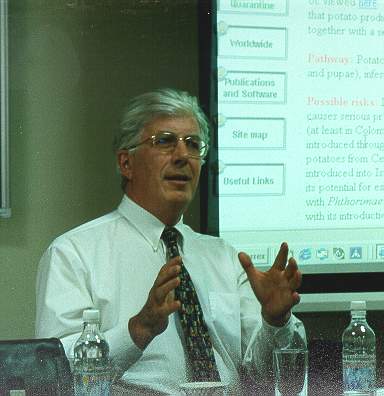
In Memoriam – Dr Ian Smith (1944-2025)
Former EPPO Director-General (years 1985-2005)

Ian Smith in 2002
Born in 1944 near London in an English / French family, Ian Smith was brought up in England where he attended school at Winchester and studied Natural Sciences at Cambridge University. After graduating in Botany in 1964, he took his Ph.D. in plant pathology at Imperial College, London. He held University lectures first at Makerere University in Uganda, and then again at Imperial College, where he supervised research in many aspects of disease resistance in plants and taught plant pathology to generations of students now working in all parts of the world. In 1978, a significant change in direction brought him to Paris, as Deputy Director of EPPO. Over the following 27 years, having become Director-General in 1985, his name has been associated with the development of European standards in plant protection, mainly with respect to plant quarantine and to pesticide registration, with the publication of widely used texts (European Handbook of Plant Diseases, Quarantine Pests for Europe), and later with international standards on phytosanitary measures developed by FAO in the framework of the International Plant Protection Convention (IPPC) the intergovernmental treaty that aims to protect the world's plants, agricultural products and natural resources from plant pests.
Dr Ian Smith has been an extremely active Director-General of EPPO, not only by strengthening existing activities but also by opening new areas of work for the Organization. For example, he has initiated the work of EPPO on invasive alien plants, diagnostics, and biological control. Always forward-thinking and open to innovation, he was quick to embrace digital technologies as they emerged, helping to lead EPPO into the digital age. Together with his wife Clare, he developed the first EPPO computer database on plant protection — the PQR database. Finding an agreement with Bayer, the EPPO Plant Protection Thesaurus (EPPT) was created to maintain and further develop the Bayer code system - now known as the EPPO Codes – a useful coding system for plant and pest names. Both PQR and EPPT would later be combined, evolving into the EPPO Global Database. In collaboration with Peter Scott at CABI, he also initiated a strong partnership in the 1980s, one that continues to this day, by contributing to the CABI distribution maps of plant pests and diseases, as well as to the Crop Protection Compendium. Dr Ian Smith was an extremely active and highly involved Editor-in-Chief of the EPPO Bulletin over the years and greatly developed the journal by expanding the range of content and readership.
Dr Ian Smith has encouraged the Organization to extend its membership to the new countries of eastern Europe and central Asia. Over his directorship, 17 countries became members of the Organization. Over his career he visited all 47 countries that were EPPO members at the time, and decided to settle in Portugal when he retired in 2005. He carried on providing inputs into EPPO Global Database, in particular in botany, and to the IPPC Technical Panel for the Glossary up to 2014.
Dr Ian Smith was deeply passionate about the value of international cooperation. In the 1990s, together with Nick van der Graaf (FAO), Bruce Hopper (NAPPO), Felipe Canale (COSAVE) and other colleagues from RPPOs, he actively participated in the creation of the IPPC Secretariat and the revision of the text of the International ¨Plant Protection Convention”. He has been a major contributor to the IPPC Glossary of Phytosanitary Terms, and to many other activities of the IPPC Secretariat. He also established strong links between EPPO and the European Commission, in particular during the challenging times when the Single Market and the first EU Plant Health regulations were being developed. By giving numerous lectures at scientific conferences across the world and participating in various international projects, he positively contributed to EPPO’s reputation, while advocating for the necessity of protecting plants against pests and diseases at international level. In 2006, he was awarded the EPPO Gold Medal in recognition of his outstanding merit in international cooperation in plant protection.
At EPPO, those who had the privilege of working with him remember him with great respect and affection. He is remembered as a highly knowledgeable man and a visionary leader who guided EPPO through major challenges over nearly three decades, helping it grow and preparing it to continue playing a key role in the future.
Dr Ian Smith passed away on 20 June 2025 aged 81. He leaves behind his wife Clare and his children Cathy, Emily, Claudia, Louis, his seven grandchildren and two great-grandchildren.
